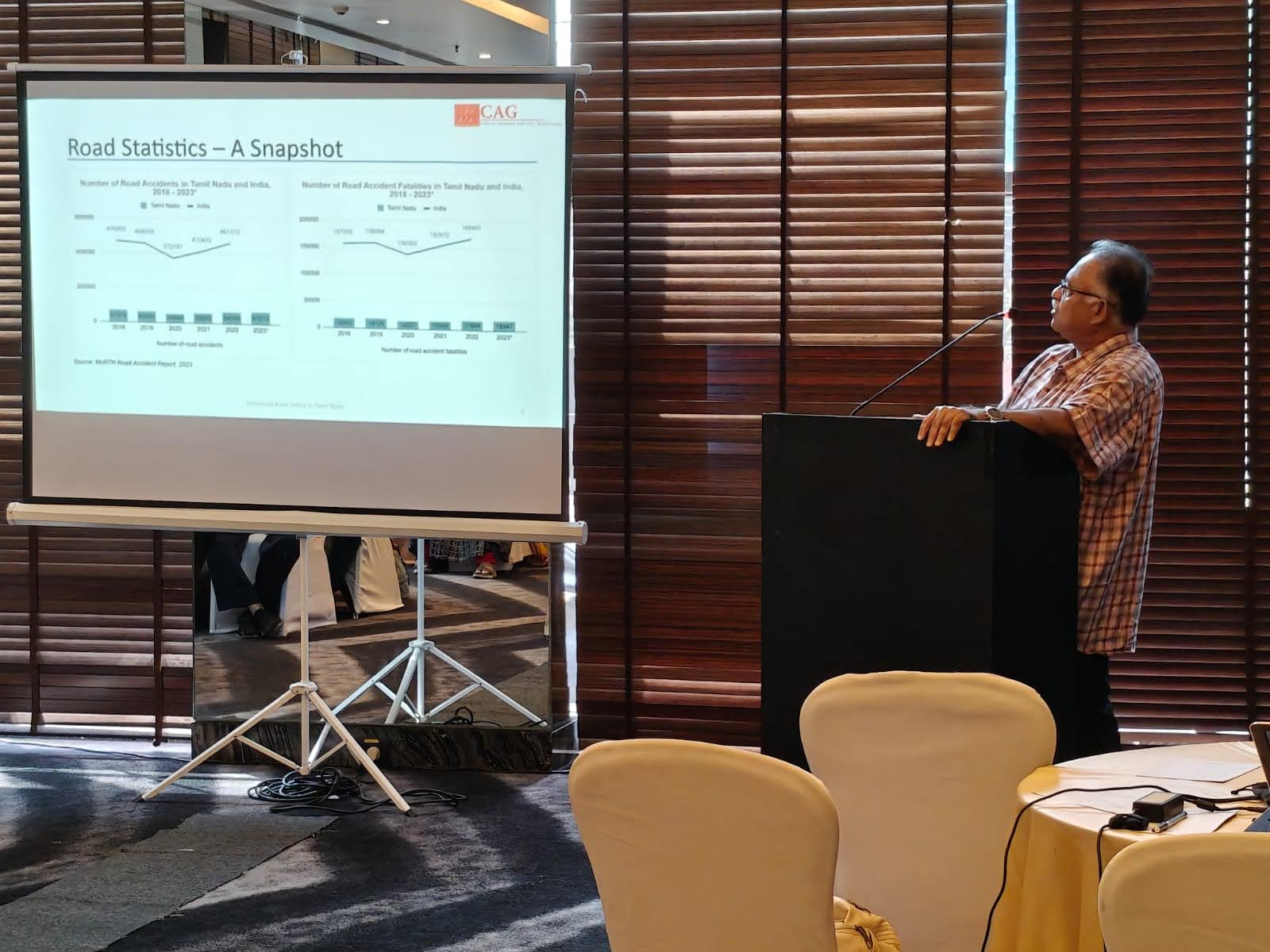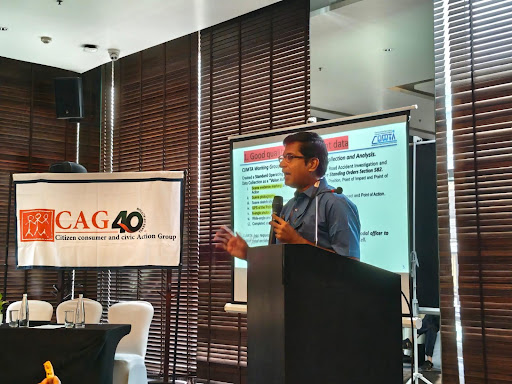The Expert Consultation on the Road Safety Action Plan for Tamil Nadu, organised by Citizen consumer and civic Action Group (CAG), brought together experts and stakeholders from diverse sectors to deliberate on strategies for strengthening road safety across the state. The consultation sought to identify actionable priorities, enhance data-driven decision-making, and promote coordinated implementation of safety measures. Participants included representatives from the Chennai Unified Metropolitan Transport Authority (CUMTA), Traffic Police, Transport and Road Safety Commissioner’s office, State Highways, and Health Departments, as well as members from academic institutions such as Centre for Excellence on Road Safety (CEoRS), IIT Madras and Anna University, and civil society organisations working on road safety and trauma care including Alert, Thozhan, Poovulagin Nambargal, and ASAR.
Date: October 9, 2025
Venue: Novotel Hotel, Chennai
Organised by: Citizen consumer and civic Action Group (CAG)

George Cheriyan - Consultant CAG presented on TNs share in road accidents
The consultation covered a wide range of indicators central to the development of a comprehensive state-level road safety action plan, including driver training and enforcement, data-driven safety management, institutional and legislative strengthening, implementation and monitoring mechanisms, trauma care enhancement, education and awareness, and sustainable funding and partnerships.
Importance of Driver Training & Enforcement
Experts emphasised that rigorous driver training and effective enforcement are essential to improving safety outcomes. The absence of proper road markings and signage was identified as a major barrier to consistent enforcement, with several experts noting that technological surveillance such as CCTV systems cannot function effectively without a well-marked road environment. Strict compliance with helmet and seat-belt use under the Motor Vehicles Act was highlighted as non-negotiable. The discussion also underscored the need for systematic driver education, particularly within Regional Transport Offices, and regular vehicle maintenance checks. Randomised enforcement models, as used internationally, were recommended to replace predictable policing patterns.
In addition, stronger checks and balances within the licensing process and improved accountability mechanisms for transport operators were proposed. Enforcement of the Good Samaritan Law was seen as critical, with hospitals required to admit and treat victims promptly without procedural delays.
Data-Driven Road Safety Measures
Data integration and evidence-based planning key focus of the discussions. Experts called for a high-quality, multi-disciplinary accident information system that combines data from police, transport, health, and urban departments. The need for detailed crash investigation reports—covering perception, action, impact, and final positions—was reiterated to support accurate root-cause analysis.
Advanced tools such as digital crash databases, perception surveys, and trauma preparedness assessments are already being implemented across districts and should be institutionalised state-wide. Participants also highlighted the need to go beyond identifying black spots and look at other areas too. Regular data sharing between enforcement agencies, health systems, and local governments was deemed vital for continuous monitoring and corrective action.
Institutional & Legislative Strengthening
The consultation noted that state and local agencies must have clearly defined roles and responsibilities. Establishing taluk-level road-owning units with dedicated funds was proposed to ensure accountability for maintenance and safety interventions. Coordination among road-owning bodies, enforcement agencies, and municipal corporations needs to be strengthened through formal protocols.
Participants also supported the formation of a dedicated state-level authority, for better coordination between various agencies and departments linked to road safety, similar to the State Road Safety Authorities in the state of Kerala, Gujarat and Karnataka and aligned with national initiatives such as the proposed Gati Shakti Transport Authority of India, to streamline efforts in improving road safety. Institutional reforms must prioritise implementation of Indian Roads Congress guidelines/standards, transparent data-sharing frameworks, and integration of safety considerations into every infrastructure project. The example of Kolkata Traffic Police who have their own road marking and signage unit was discussed as a good example that could be adopted in other cities as well.

Mr Ravishankar - Road safety Expert CUMTA presented CUMTA’s interventions for road safety
Implementation & Monitoring
Implementation was recognised as the weakest link in current safety programmes. Experts agreed that each action plan should focus on clearly defined, measurable problem statements supported by periodic monitoring. Road markings, signage, and lighting should precede technology-based enforcement efforts. All new road projects must adopt a “design for safety” approach incorporating traffic-calming measures such as raised pedestrian crossings, bumps as per approved standards and controlled median openings.
Monitoring mechanisms should include regular safety audits, outcome-based performance tracking, and public dashboards to report progress. A capable, cross-departmental team for crash-data analysis and follow-up actions was also recommended.
Medical & Trauma Care Enhancement
Strengthening emergency medical response was identified as a critical area. Participants stressed that private hospitals who have been listed often refused treatment and therefore implementation of Good Samaritan rules must be stricter to ensure that accident victims receive immediate treatment during golden hour irrespective of hospital ownership. Training first responders in first aid and CPR, and disseminating emergency contact information widely, were prioritised.
It was observed that the lack of prompt care and awareness of emergency protocols often exacerbates fatalities. A trauma preparedness framework is already present in TN and can be improved by regular drills and inter-hospital coordination, to improve survival rates. Improving response time of ambulances is another aspect to be focused on. At present across the State, the response time taken by the 108 network ambulances, from the time of call received to reaching the scene, is 10 minutes 14 seconds.
Education & Awareness Initiatives
Behavioural change through continuous education and public engagement was seen as fundamental to road safety. Campaigns on helmet and seat-belt use, speeding, and the dangers of distracted driving were recommended. Awareness about the Good Samaritan Law and no-honking drives should be expanded through schools, workplaces, and media platforms.
Participants suggested that public campaigns depict correct road-safety practices, including helmet use in films and advertisements, to normalise compliance. Pedestrian awareness, especially regarding right-of-way and signal discipline, was also prioritised.
Funding & Partnerships
Sustainable financing and coordinated partnerships were seen as the foundation for long-term success. Funds must be allocated for specific tasks such as road maintenance, enforcement at district or taluk levels for timely repair and enforcement activities. Collaboration between government departments, academic institutions, civil-society groups, and corporate partners was strongly encouraged.
Public–private partnerships could help expand training infrastructure, modernise bus terminals, and introduce advanced safety technologies. Lack of compliance to road challans/penalties is a major concern. An effective mechanism for collection of penalties, including long pending dues needs to be developed and enforced strictly. Transparent utilisation of road-safety funds was identified as key enablers of implementation.
Conclusion
The consultation concluded that Tamil Nadu’s Road Safety Action Plan must be anchored in accurate data, clear institutional responsibilities, strict enforcement, and continuous public engagement. Strengthening trauma response systems, safe systems approach, embedding safety in road design, and ensuring steady funding were recognised as immediate priorities. Through coordinated action and sustained commitment, the state can move decisively toward the shared vision of zero fatalities on its roads, and effectively contribute towards achieving the ambitious global target of halving road fatalities and injuries by 2030.
A total of around 25 experts/participants attended the consultation representing various state holders.
Participants